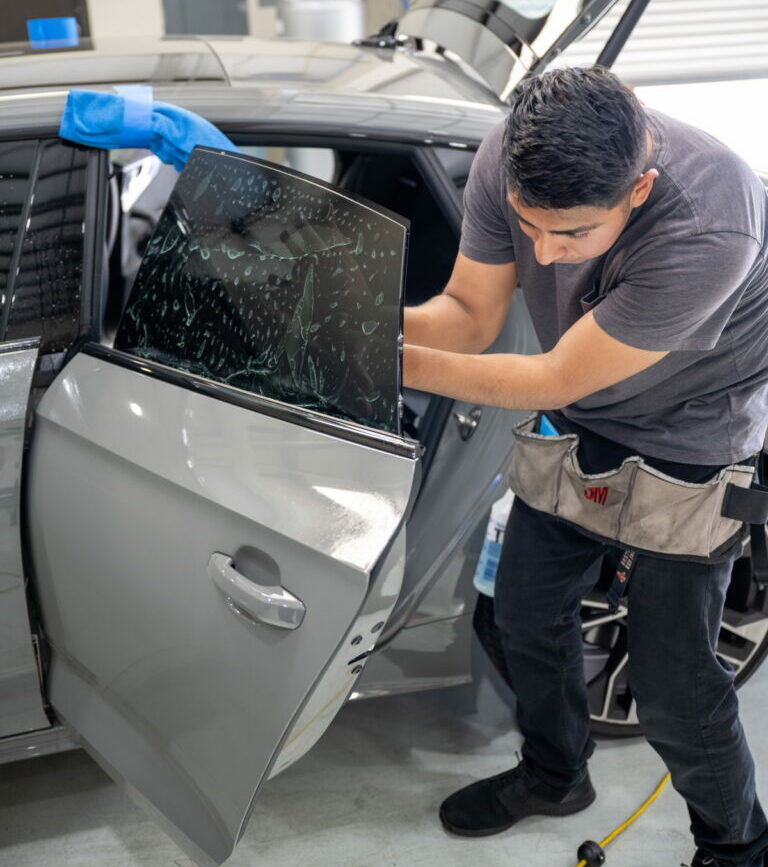Car Window Tint – What is Car Tint and What are the Benefits
Applying Automotive Window Film and its Benefits
Applying window film to your car windows can bring advantages as it can reduce the sun’s glare, increase privacy, enhance safety, protect against skin cancer, save energy, prevent fading of your interior, and more…
And, of course, it also adds to the aesthetic appearance of your vehicle.
However, before you opt to install window film, we are assuming your window glass is in excellent condition and does not contain any chips or scratches.
Suppose your glass has scratches on the inside. Applying window film should not change the finished look. But, if you have blemishes on the outside of the glass, using window film will emphasize those scratches, and there is nothing the window film installer can do to remove or repair those scratches.
The only option is to replace the automotive glass.
This post will reveal everything you should know about car window tint and what advantages it can bring to your vehicle.
What is Car Window Tint?
Window tint is a scratch-resistant film that adheres to the inside of your car windows.
Every type of window film available on the market uses a base polyester film as its foundation. Polyester film is produced from polyethylene terephthalate, commonly known as PET.
Polyester film was created in the late 1920s and became a popular laminating material. This Polyester based film resists moisture and hot and cold temperatures very well. It’s also flexible and strong, making it ideal for installation on curved back windshields.
A polyester film can also accept dyes, metalized layers, and nanoceramic materials.
This thin polyester-based film makes your car windows look aesthetically pleasing and challenging for people to peer through the glass, adding privacy when selecting a darker shade.
Installing window film is a challenging process, and it’s applied in one piece without creases or wrinkles. Therefore, professional installation is recommended.
Metallic Film:
The metalized tinted film utilizes the small metallic particles to dissipate heat by reflecting away from the interior space, just like in the case of dyed tinted film. These particles are very tiny and sputtered into the film.
A metallic window film tends to be shiny and reflective (looking like polished metal, e.g.) and creates a mirrored look that can detract from the appearance of a vehicle.
However, this film can interfere with cell phone signals and GPS signals and may not be a good option if you use your phone in your car. Therefore, a metallic film is losing its popularity as a choice of automotive window film.
Ceramic window tint can help you stay safe on the road by reducing sun glare. Your shade will only let 50% of light enter your car, making it a lot easier to see while driving. That’s even true at night, as ceramic tint film blocks light without compromising your safety or visibility.
Ceramic window tint is the most expensive because of the advanced technology required to create this film.
While ceramic tints can cost more than other tints available on the market, their UV blocking properties and cleaner appearance is well worth the extra cost. The window tint protects you and your car’s interior from harmful rays that can lead to damage and even skin cancer.
There are multiple grades of ceramic window tints for cars. Some are designed for aesthetic appeal, while others provide superior UV protection or infrared radiation blocking technology.
Ceramic window tint is the pinnacle of window protection. It’s engineered for superior clarity, blocking 99.9 percent of UVA and UVB, and most importantly – helps to keep the inside of your vehicle cooler – when infused with IR blocking materials.
High-quality ceramic window tint doesn’t just keep UV rays out of your car; it also blocks 80% of infrared light. Infrared rays are why we feel the heat from the sun, so with fewer rays, tinted windows decrease your vehicle’s interior temperature, even if you must park in the sun.
In the event of an accident, it’s intended for car windows to shatter when breaking to lessen the threat of large glass fragments encountering skin.
While this does improve safety in the event of a car accident, shattered glass is still dangerous.
The strong adhesive used to apply automotive window film will help keep your windows installed. Even if the glass shatters, you can expect the glass to stay fixed to the film, which results in fewer cuts and abrasions on the skin.
[sc name=”quote”][/sc]











